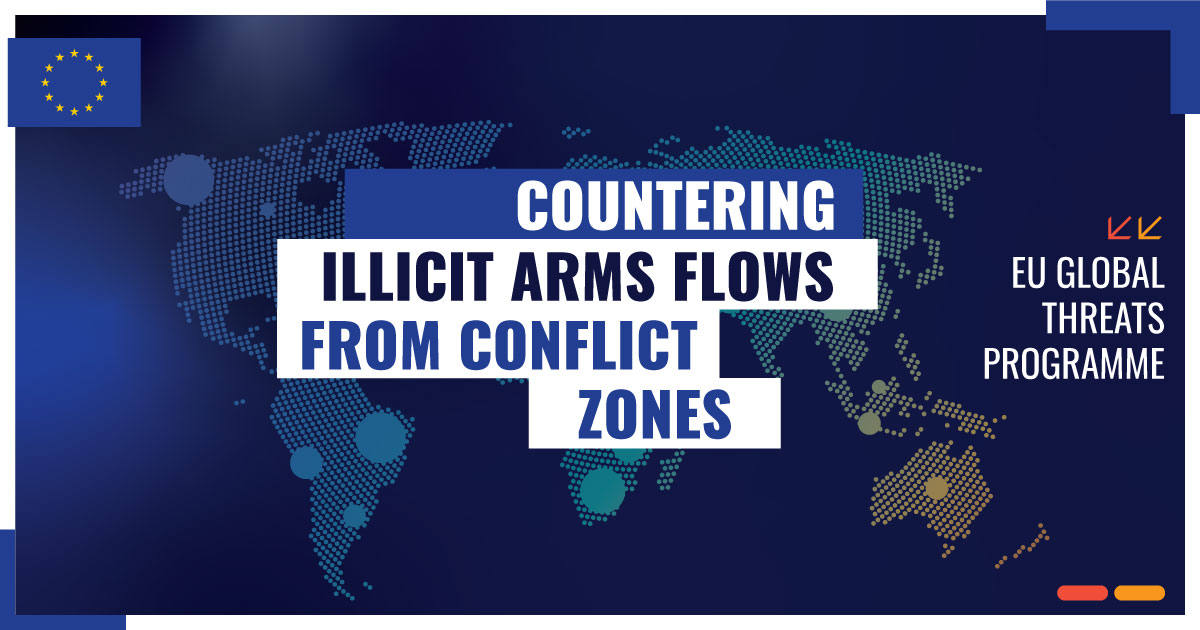
Context
Illicit firearms trafficking is largely driven by the diversion of legal weapons and conflict-related stockpiles, with surpluses from wars, such as in Afghanistan and Ukraine, sustaining global insecurity. Russia’s war of agression against Ukraine has created a new hotspot for diverted arms, while ongoing instability also across Sub-Saharan Africa makes it a key destination for trafficked weapons. As such, conflict weapons from Ukraine and Central Asia have the potential to further entrench these ongoing conflicts, while feeding new unrests in Africa and globally. Historically, the issue of Small Arms and Light Weapons (SALW) deriving from battlefields has repeatedly been addressed only when arms have been diverted and channeled through trafficking routes. Lack of proper registration and tracking of firearms hinders the ability to accurately assess the volume and types of weapons in circulation, complicating intelligence-led investigations.
iARMS V seeks to tackle these challenges by analysing the connections between organisedcrime and terrorism across linked regions.
Overall objective
This project aims to reduce SALW trafficking and related organised crime and terrorism activities globally.
Specific objectives
- To increase beneficiary countries’ resilience against SALW trafficking.
- To disrupt organised crime through intelligence-led law enforcement operations targeting SALW trafficking.
Concrete activities
- Missions and trainings across Central Asia, Africa and Europe to raise awareness among national firearms authorities and appoint National Weapons Investigations Teams (WIT) for implementing the Firearms Recovery Protocol using INTERPOL databases at local and national levels.
- Operationalisation of the WIT through intelligence-led law enforcement transregional operations.
- Launch of the INTERPOL Firearms Criminal analysis file to provide investigation support and identify trafficking flows.
- Promotion of the project and use of police cooperation instruments for firearms trafficking monitoring through regional and international forums and through collaboration with regional and international partners
- Provision of technical expertise to the United Nations Assistance Mission in Afghanistan (UNAMA), to monitor and assess the risks of diversion and trafficking and related safety and security threats (including on gender) in Afghanistan.
- Development of a firearms monitoring platform, with a specific focus on Afghanistan and the wider region, to support gathering and analysis of data and information on firearms and related organised crime and terrorism threats in place.
Expected results
- Raised awareness among practitioners at political and operational levels about the importance of investigating firearms trafficking and sharing information by promoting international tracing and trafficking investigations in both source and destination countries.
- Established national investigative teams that bring together key law enforcement agencies to enhance the use of law enforcement cooperation tools for firearms trafficking investigations (iARMS[1], IFRT[2], IBIN[3], INTERPOL Firearms Criminal analysis file).
- Build the capacity of law enforcement and criminal justice agencies to detect, prevent, investigate, and prosecute firearms trafficking while fostering effective international cooperation in law enforcement and in the judiciary.
- Disrupted criminal networks through Intelligence-led, transregional, law enforcement firearms operations.
- Enhanced use of iARMS for monitoring trafficking flows at national and regional levels.
- Investigative support through criminal analysis on SALW trafficking and its link to high-risk criminal networks.
- Offered technical expertise, advice and support to the United Nations Assistance Mission in Afghanistan (UNAMA), to monitor and assess the risks of diversion, trafficking and related security threats, including gender-related concerns in Afghanistan.
- Established firearms monitoring platform focusing on Afghanistan and the broader region to facilitate data collection and analysis on firearms trafficking and its connections to organised crime and terrorism.
- Supported neighbouring countries in their efforts to prevent, monitor and address the risks of firearms diversion, trafficking, and illicit acquisition/misuse by organised crime and terrorist groups in Afghanistan and the surrounding region.
Achievements
- Engagement with target countries to secure active participation in project activities through needs assessment missions. These missions are critical to tailor support to national contexts and enhance cooperation frameworks.
- Validation of the INTERPOL Firearms Criminal Analysis File (CAF) legal framework by the end of 2025. This development will represent a crucial step toward its operationalisation.
- Communication and presentation of the project at regional events and through partners events.
- National Firearms training in Caucasus and Central Asia.
[1] iARMS: INTERPOL Firearms Tracing Management System
[2] iFRT: INTERPOL Firearms Reference Table
[3] IBIN: INTERPOL Ballistic comparison network
- Project duration
- 12 Jan 2024 - 12 Jan 2027
- Project locations
- AfghanistanArmeniaAzerbaijanKazakhstanKyrgyzstanPakistanTajikistanTürkiyeTurkmenistanUzbekistan
- Overall budget
- €4 000 000
- Threat area
- Counter-Terrorism, Prevention of Violent Extremism
- Fight against Organised Crime
